
The Visconti of Milan are a noble Italian family. They rose to power in Milan during the Middle Ages where they ruled from 1277 to 1447, initially as Lords then as Dukes, and several collateral branches still exist. The effective founder of the Visconti Lordship of Milan was the Archbishop Ottone, who wrested control of the city from the rival Della Torre family in 1277.

Albert I, a member of the House of Gorizia, ruled the counties of Gorizia (Görz) and Tyrol from 1258, jointly with his elder brother Meinhard IV. In 1271, the brothers divided their heritage and Albert became sole ruler of the Gorizia estates until his death. His descendants, known collectively as the Albertine line, ruled the County of Gorizia until the extinction of the House in 1500.
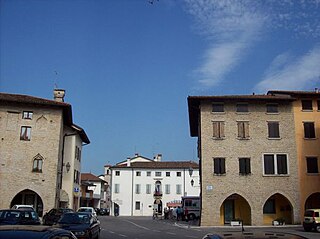
Valvasone Arzene is a comune (municipality) in the Regional decentralization entity of Pordenone in the Italian region of Friuli-Venezia Giulia, located about 80 kilometres (50 mi) northwest of Trieste and about 15 kilometres (9 mi) east of Pordenone. It was formed on 1 January 2015 after the merger of the previous comuni of Valvasone and Arzene.

Ottone Visconti was Archbishop of Milan and Lord of Milan, the first of the Visconti line. Under his rule, the commune of Milan became a strong Ghibelline city and one of the Holy Roman Empire's seats in Italy.
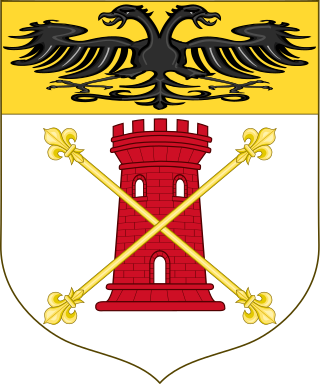
The House of Della Torre were an Italian noble family who rose to prominence in Lombardy during the 12th–14th centuries, until they held the lordship of Milan before being ousted by the Visconti.
Gherardo III da Camino was an Italian feudal lord and military leader. He is generally considered the most outstanding member in the da Camino family.
Rizzardo IV da Camino was an Italian nobleman and military leader, a member of the da Camino family and lord of Treviso.

Lodovico della Torre was Patriarch of Aquileia from 1359 until 1365.
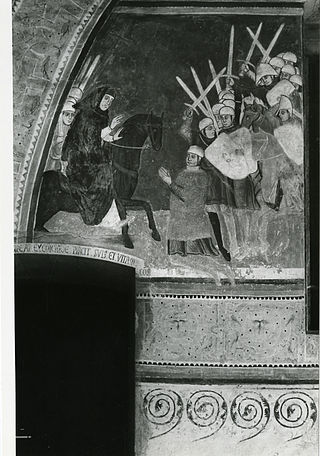
The Battle of Desio was fought on 21 January 1277 between the Della Torre and Visconti families for the control of Milan and its countryside. The battlefield is located near the modern Desio, a commune outside the city in Lombardy, Northern Italy.
Napoleone della Torre, also known as Napo della Torre or Napo Torriani, was an Italian nobleman, who was effective Lord of Milan in the late 13th century. He was a member of the della Torre family, the father of Corrado della Torre and the brother of Raimondo della Torre.
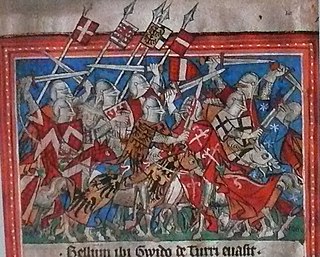
Guido della Torre was a Lord of Milan between 1302 and 1312.
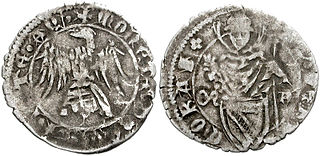
Marquard of Randeck was Patriarch of Aquileia from 1365 until his death.
Biaquino II da Camino was an Italian nobleman and military leader, a member of the da Camino family and lord of Treviso.
Tolberto III da Camino (1263–1317) was an Italian nobleman and military leader, a member of the Da Camino family.
Guecellone VII da Camino was an Italian nobleman and lord of Treviso.

Matteo I Visconti (1250–1322) was the second of the Milanese Visconti family to govern Milan. Matteo was born to Teobaldo Visconti and Anastasia Pirovano.
Corrado della Torre, also called Mosca was an Italian medieval politician and condottiero, a member of the Torriani family.

Cassone della Torre, also called Mosca was an Italian medieval condottiero and feudal lord. A member of the Torriani family, he was Archbishop of Milan from 1308 to 1316 and patriarch of Aquileia from 1317 to 1318.

Pagano della Torre was Patriarch of Aquileia from 1319 until 1332. Another with the same name, Pagano I della Torre, was a Guelph military leader and lord of the Valchiavenna during the first half of the 13th century. Among his grandchildren were Martino, Napoleone, Guido, and Filippo della Torre, all involved in regional conflicts of Lombardy.












